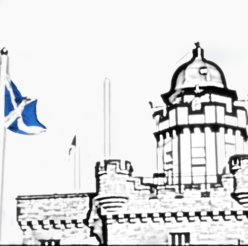Graham Crow
The sociological habit of thinking comparatively across time and space proves particularly useful at times when the familiar world is turned upside down and we are forced to reflect on what is ‘normal’. To-day my principal role was to act as internal examiner for a PhD viva in the changed circumstances of COVID-19 ‘lockdown’. The ‘new normal’ is the viva conducted virtually (in our case via Skype), and the whole thing passed off successfully aside from a delay to our schedule related to connection issues. Certainly academic standards were not allowed to slip.
In the run up to the viva I had remembered a passage from Harrison E. Salisbury’s book about the siege of Leningrad during the Second World War when the city was surrounded and Hitler’s troops and their allies sought over a period of nearly three years to starve the population into submission. Defiance by the city’s occupants was famously crystallised by Shostakovich’s Symphony number 7 and its remarkable performance in the city (as well as elsewhere). But Salisbury’s book recounts many other acts of resistance, including the example of which I was reminded this week: ‘The presentation and defense of doctoral dissertations had gone on without pause in Leningrad, all through the terrible winter [of 1941-2], in air-raid shelters, in cellars. There had been 847 defences of dissertations in the first months of the war. In December [1941] the Leningrad Party Committee warned the academic community “not to permit any liberalization in evaluating the work of students” just because of the war and its hardships. So the intellectual life of Leningrad went on….’ [1].
Estimates of the people who died during the 900 days vary but at well over a million dwarf those for the current pandemic. Moreover, the conditions in which those who survived had to exist – not only starvation but also shelling and bombing, intense cold, and the risk of falling victim to cannibals – in no sense provide a direct comparison to our current travails. But such episodes can still reveal much about human behaviour and resilience from which we can learn, as well as about the appropriateness or otherwise of likening the fight against the coronavirus to a war.
And one comparison can lead to another. Within a decade of the siege of Leningrad being lifted the Soviet leader Stalin was dead, and the search for a new normal for the country was being sought. His eventual successor, Nikita Khrushchev, wanted to ease the restrictiveness of the Stalinist regime but feared the consequences of relaxing restrictions too quickly and too much. As he put it, he was ‘afraid the thaw might unleash a flood, which we wouldn’t be able to control and which could drown us’ [2]. Once again, the land of Stalin’s secret police and Gulag camps and our own more limited restrictions on movement and association are not directly comparable, but there may nevertheless be some food for thought in considering the challenges faced not only in maintaining restrictions but also in managing their relaxation. Khrushchev was indeed ousted from power in 1964, but survived long enough to write his memoirs. He is also remembered for his unconventional means of gaining people’s attention [3]. But that is another story.
Footnotes
- Harrison E. Salisbury, The 900 Days: The Siege of Leningrad, London: Pan Books, 2000, p.496.
- Quoted in Stephen Cohen, Rethinking the Soviet Experience, Oxford: Oxford University Press, 1986, p.111
- Roy Underhill, Khrushchev’s Shoe and other ways to captivate audiences from one to one thousand, Cambridge, MA: Perseus, 2000.
